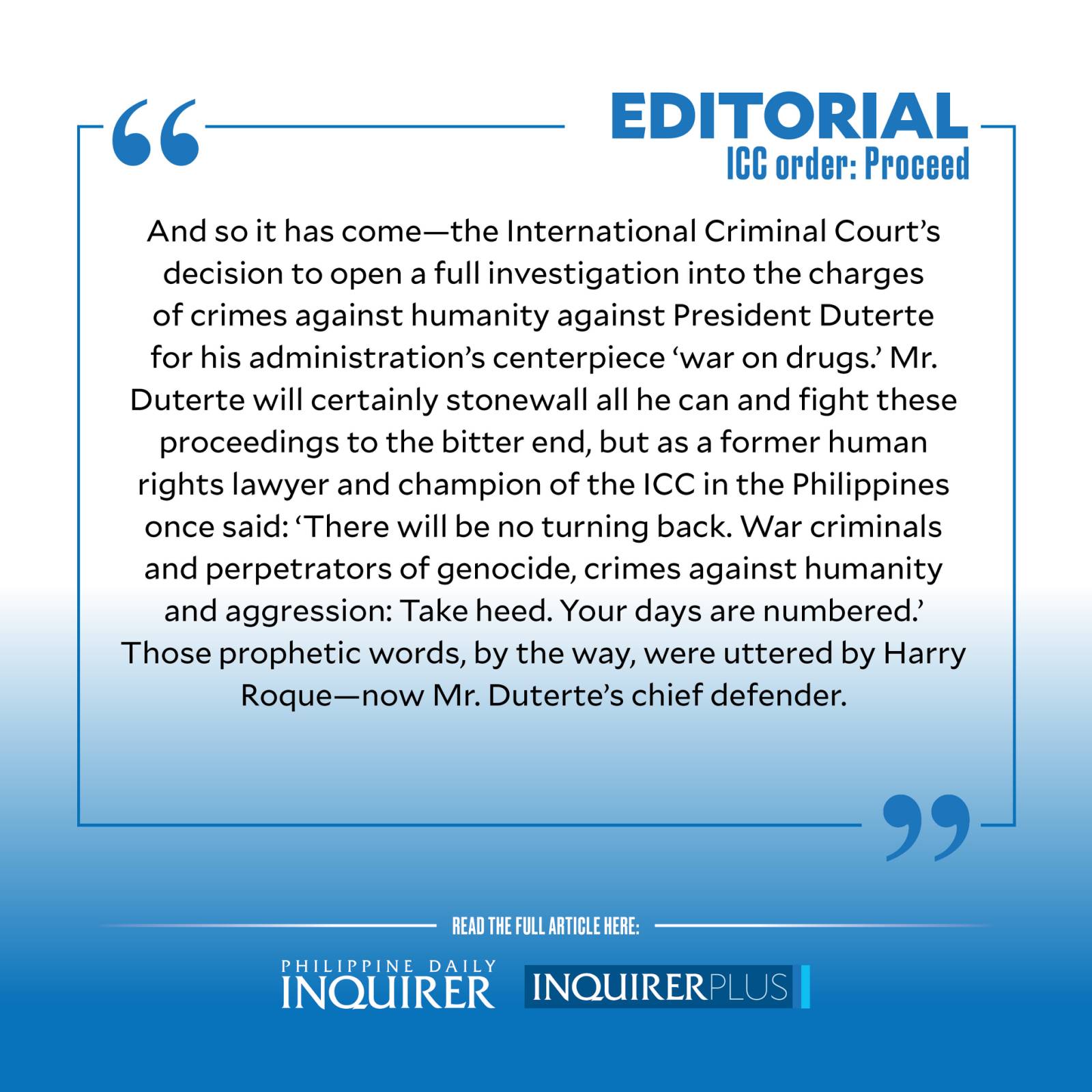ICC order: Proceed

And so it has come—the International Criminal Court’s (ICC) decision to open a full investigation into the charges of crimes against humanity against President Duterte for his administration’s centerpiece “war on drugs.”
The ICC’s Pre-Trial Chamber announced Sept. 15 that it had found “reasonable basis” to proceed with the official probe, as the “specific legal element of the crime against humanity of murder” has been allegedly met in the bloody crackdown that began as soon as Mr. Duterte warmed his seat in Malacañang in July 2016.
The Hague-based tribunal noted in its 45-page decision that Mr. Duterte’s flagship “war on drugs” campaign “cannot be seen as a legitimate law enforcement operation, and the killings neither as legitimate nor as mere excesses in an otherwise legitimate operation.” Also, there were indications that “a widespread and systematic attack against the civilian population took place pursuant to or in furtherance of a State policy,” and that the evidence pointed to the government’s failure “to take meaningful steps to investigate or prosecute the killings.”
Philippine National Police data pegged the death toll of the drug war at 6,165 suspected drug suspects from July 2016 to June 2021. But human rights groups claim that as many as 30,000, mostly poor Filipinos including children, have died in the name of the anti-narcotics campaign.
The chamber’s three judges based their decision on a mass of evidence, including official issuances by Philippine authorities, documents from the United Nations and nongovernment organizations, press reports, and testimonies of victims’ kin supporting the request for an investigation filed by former ICC prosecutor Fatou Bensouda just before she retired in June.
Bensouda had said in her submission that there was indeed “reasonable basis to believe that the crime against humanity of murder was committed” due to the Duterte administration’s “war on drugs” campaign from July 1, 2016 to March 16, 2019, or before the Philippines’ withdrawal from the Rome Statute, which created the ICC, took effect.
Gathered information, she said, suggested that “state actors, primarily members of the Philippine security forces, killed thousands of suspected drug users and other civilians during official law enforcement operations,” and that the police and other government officials “planned, ordered, and sometimes directly perpetrated extrajudicial killings (EJKs).”
Ominously for Mr. Duterte and his lieutenants, the ICC will not limit itself to the killings under the current administration. Noting an earlier similar pattern of EJKs in Davao allegedly perpetrated by the so-called Davao Death Squad vigilante group, the ICC probe will also cover the period November 2011-June 2016 when Mr. Duterte served as vice mayor and then mayor of that city.
Responding to the electrifying announcement, Malacañang said the ICC probe will receive no cooperation from the Duterte administration, and that ICC investigators will not be permitted to enter the country.
Presidential legal counsel Salvador Panelo, summoning all the bravado he could muster, said the ICC investigation “neither bothers nor troubles the President and his administration.” Taking the same tack, presidential spokesperson Harry Roque insisted that the cases against Mr. Duterte “will just sleep due to the absence of cooperation, particularly from the police, and no evidence will really be gathered.”
No evidence? The families of the victims who had sought the ICC’s help have expressed their “overwhelming support” for and desire to take part in the international probe, according to the families’ lawyers. The grieving families have welcomed the ICC decision as a “glimpse of light” toward justice, and Edre Olalia, the president of the National Union of Peoples’ Lawyers, said he hopes it is “the beginning of the end to impunity.”
Bensouda’s successor at the Office of the Prosecutor, former British barrister Karim Khan, will now oversee the actual probe, and possible trial of the case, which could bestow on Mr. Duterte the ignoble distinction of being the first Southeast Asian leader to stand trial for crimes against humanity. The Pre-Trial Chamber stopped short of naming suspects but did explicitly cite President Duterte and Sen. Ronald dela Rosa, who led the drug war during his stint as PNP chief, for their public statements that seemingly incited or encouraged the killing of drug suspects.
Mr. Duterte will certainly stonewall all he can and fight these proceedings to the bitter end, but as a former human rights lawyer and champion of the ICC in the Philippines once said: “There will be no turning back. War criminals and perpetrators of genocide, crimes against humanity and aggression: Take heed. Your days are numbered.”
Those prophetic words, by the way, were uttered by Harry Roque—now Mr. Duterte’s chief defender.
















